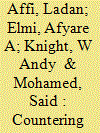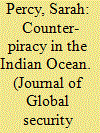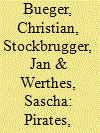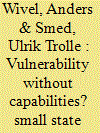|
|
|
Sort Order |
|
|
|
Items / Page
|
|
|
|
|
|
|
| Srl | Item |
| 1 |
ID:
144274


|
|
|
|
|
| Summary/Abstract |
Employing secondary research and semi-structured interviews, this article examines the use of private maritime security companies (PMSC) in providing maritime security services in the Horn of Africa. It consists of four parts. The first part explains the origins and development of the use of PMSC in the Horn of Africa. The second section discusses the regulation of the private security industry, paying particular attention to the maritime context. Part three examines the challenges associated with the use of maritime PMSC in the Horn of Africa, including negative human rights implications, compromising the innocent passage of commercial ships, and creating confusion in the hierarchical control of ships. Finally, the paper analyses the findings and concludes that PMSC, despite their apparent short-term effectiveness, cannot be regarded as a long-term solution to the piracy phenomenon in the Horn of Africa.
|
|
|
|
|
|
|
|
|
|
|
|
|
|
|
|
| 2 |
ID:
150482


|
|
|
|
|
| Summary/Abstract |
This article examines how a group of loosely connected, often adversarial states have managed to conduct successful counter-piracy operations off the coast of Somalia. The traditional literature on multinational military cooperation assumes that such cooperation will be successful when it is hierarchically organized with a strong central command and unity of action. Counter-piracy has functioned well because it takes a fundamentally different, networked form. Counter-piracy operations are egalitarian, rather than hierarchical, and operate using informal links between militaries. This article considers the implications of informal military cooperation, and the extent to which lessons from counter-piracy can be applied elsewhere.
|
|
|
|
|
|
|
|
|
|
|
|
|
|
|
|
| 3 |
ID:
106771


|
|
|
|
|
| Publication |
2011.
|
| Summary/Abstract |
The dominant approach to counter-piracy strategy off Somalia is astonishingly narrow-minded. Deterrence, surveillance and military operations do not provide sustainable or efficient solutions; better strategic alternatives must draw on the lessons of 21st-century peace operations. This perspective leads to an understanding of counterpiracy as a problem of peacebuilding. This allows restructuring and reframing of the problem to permit a much wider repertoire of policy solutions than is currently conceived. This repertoire may include development and security assistance programmes as well as state-building programmes. The approach also permits integration of lessons learned in the frame of international peacebuilding operations, including avoiding technocratic solutions, focusing on power constellations, integrating local knowledge and incrementalism. If the international community wishes to take piracy seriously and respond to its complexities, it would be well advised to adopt a policy in which such alternatives are considered.
|
|
|
|
|
|
|
|
|
|
|
|
|
|
|
|
| 4 |
ID:
151391


|
|
|
|
|
| Summary/Abstract |
Today, small European states regularly need to go out of area and out of tried and tested institutional settings to defend their security interests. How do small European states meet this challenge most effectively? This analysis suggests that small states can influence multilateral decisions on international security by combining norm entrepreneurship with lobbying and taking on the role as an “honest broker”. However, economic capacity, an effective state administration, and interests compatible with the agendas of the great powers are key to success. Based on a comprehensive empirical material including 19 elite interviews as well as official documents and other written material, we process trace how one small European state, Denmark, influenced the development of international counter-piracy cooperation and the development of an international counter-piracy strategy for the Gulf of Aden and off the Horn of Africa and discuss which lessons the Danish case may hold for other small states.
|
|
|
|
|
|
|
|
|
|
|
|
|
|
|
|
|
|
|
|
|